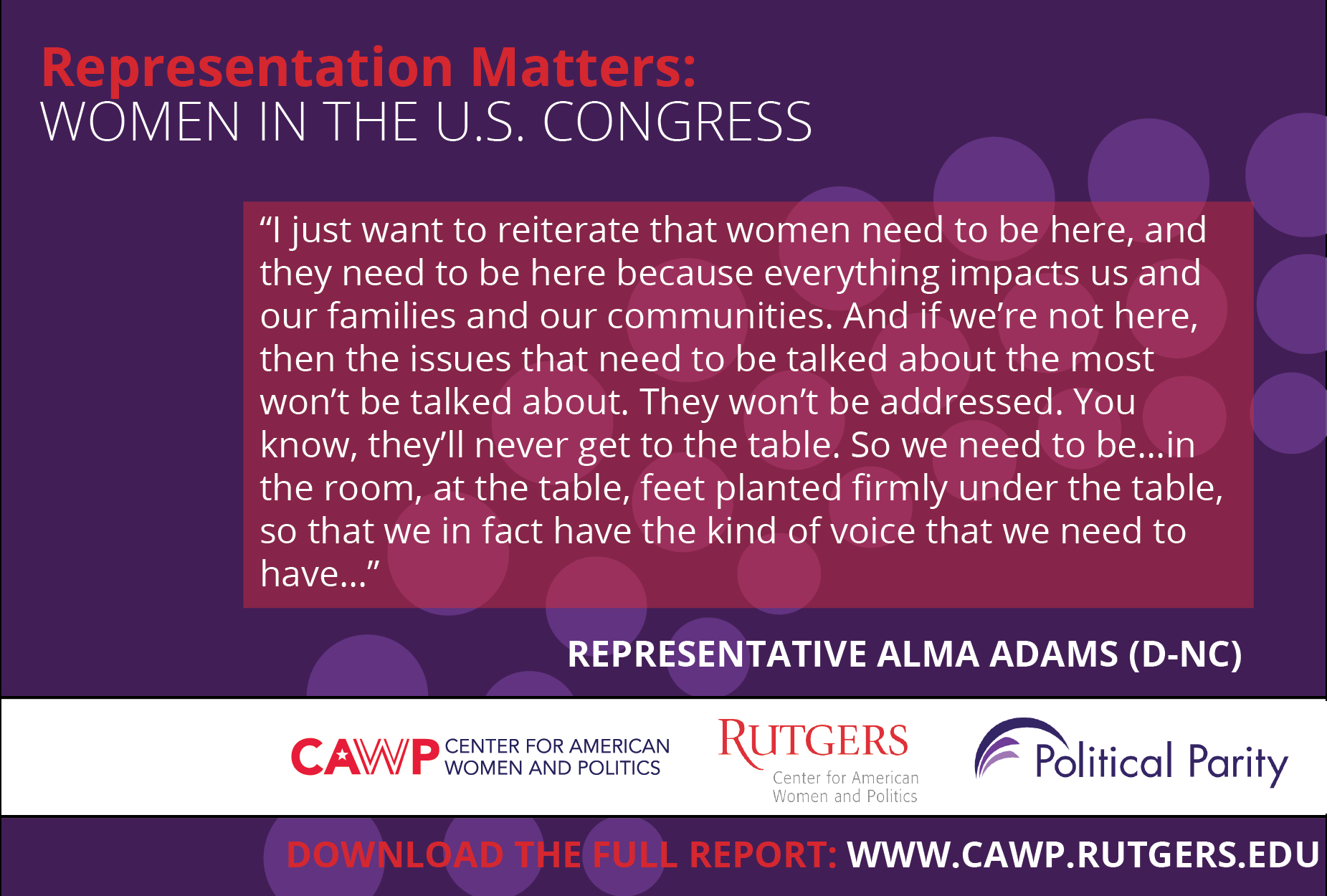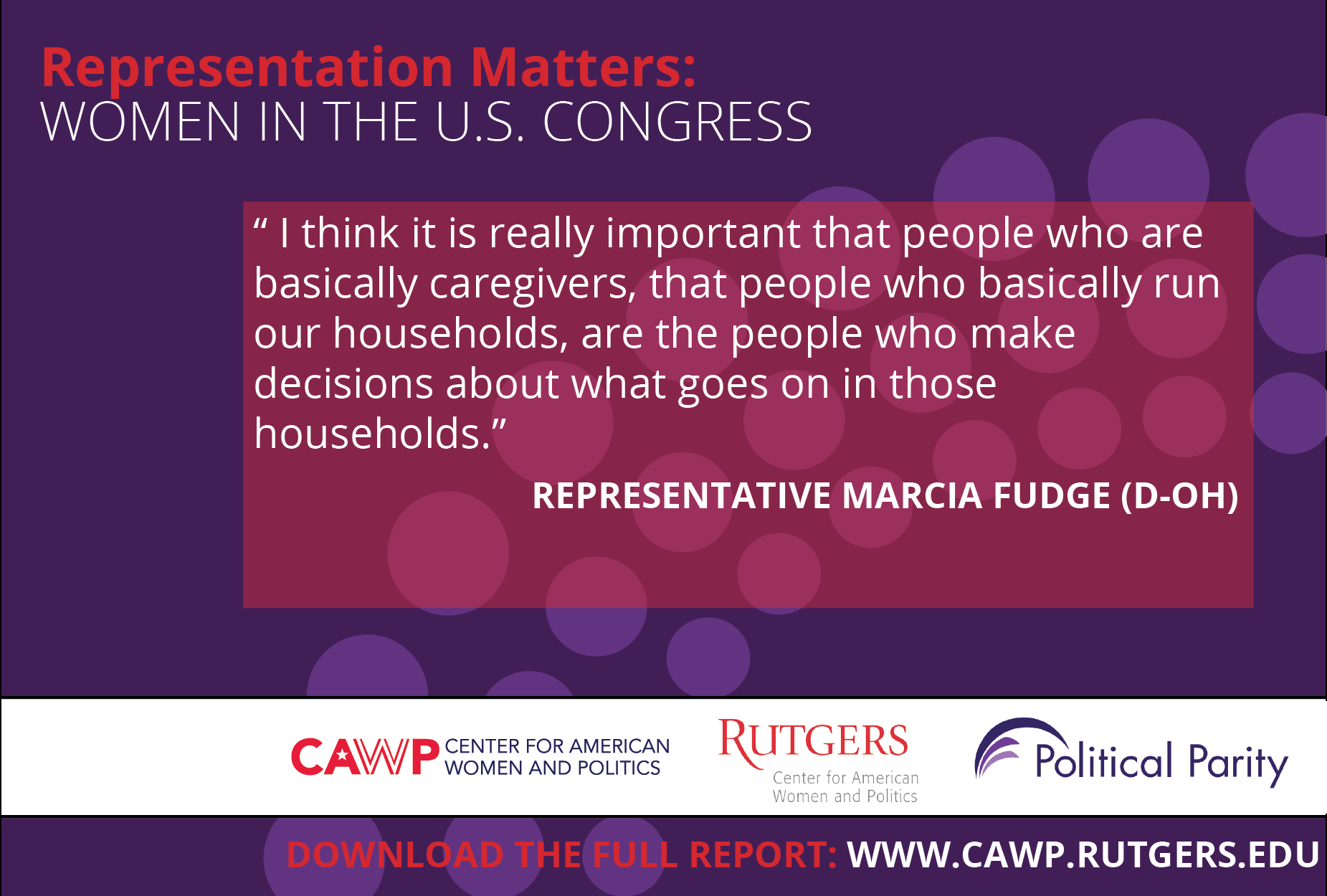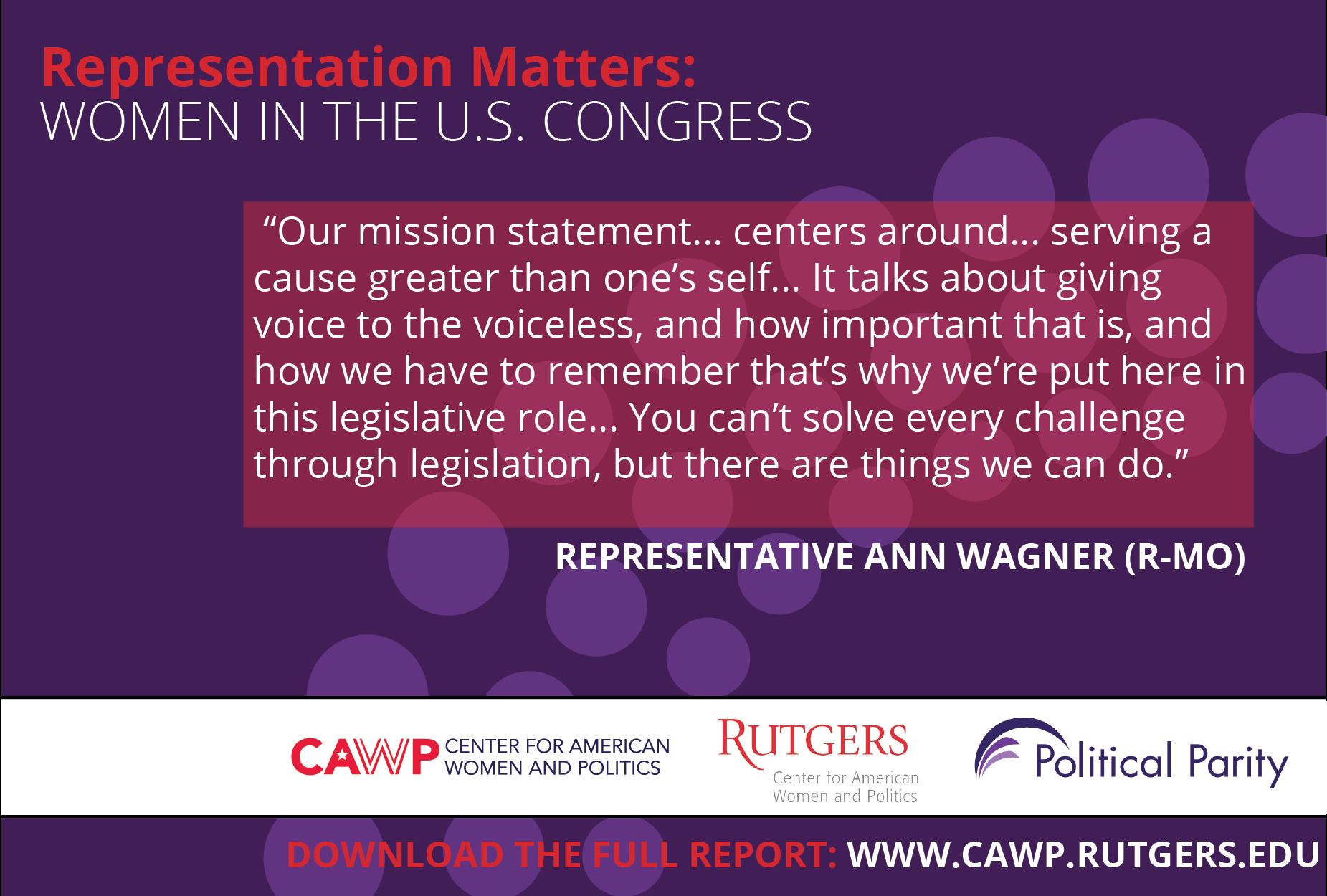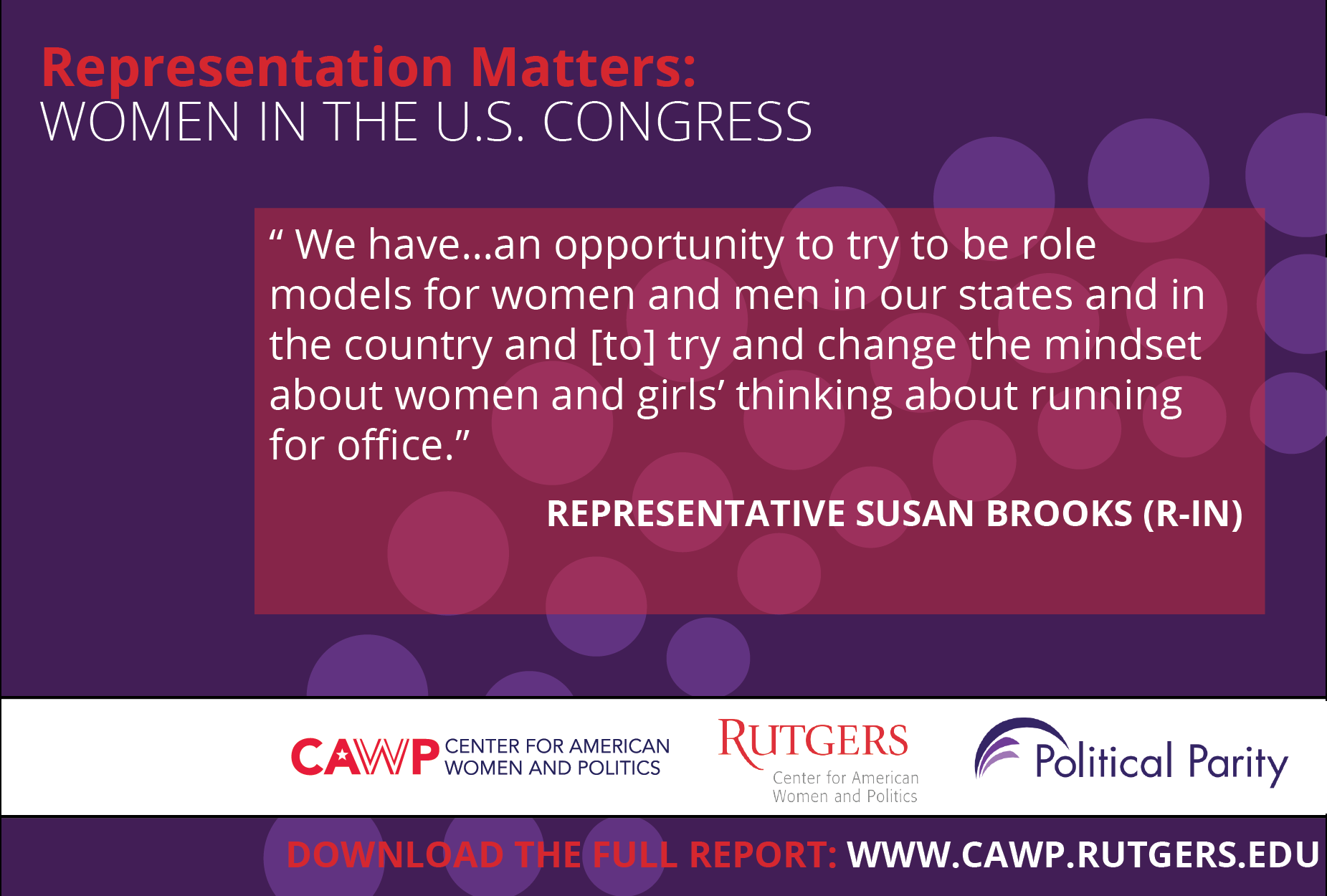Making the Case for More Women in Office? Our Interviews with 83 Congresswomen Can Help
Between September 2015 and August 2016, our research team at the Center for American Women and Politics (CAWP) at Rutgers University-New Brunswick conducted interviews with 83 of the 108 women who served in the 114th Congress. The information we gathered from over 40 hours of member interviews is outlined in our recent report, Representation Matters: Women in the U.S. Congress. Included among our findings are key insights from congresswomen that not only demonstrate why it matters that a diverse group of women hold elective offices, but also make the case that this form of political power is worth fighting for, whether on the campaign trail or within policymaking institutions.
Democratic Leader Nancy Pelosi (D-CA) told us, “I do know this. This is not for the faint of heart, and you really have to be ready to make the fight.” But she added, “It’s worth it. It’s necessary for our country.” She is right, and below are some useful observations from the other congresswomen we interviewed that further make the case for women’s political representation.
We hope you will draw from these “5 Reasons More Women Should Run for Office” to encourage women to consider candidacy, urge others to support women’s representation, and contribute to the work already being done to increase the numbers of women in elected office nationwide.
1. Public service provides significant opportunities for women - including the opportunity to bring issues to policy agendas that would not otherwise be there.
Senator Kirsten Gillibrand (D-NY) told us, “[Women members have made a difference by] raising issues that previously didn’t get the light of day.” Similarly, Representative Debbie Wasserman Schultz (D-FL) explained, “There are just issues that would not have reached the top of the agenda without women there pushing to make sure.” These insights are in line with existing research demonstrating the ways in which women, and specific groups of women legislators, bring distinct priorities to the legislative agenda. They also expand policy agendas, as Representative Maxine Waters (D-CA) noted, “I’m saying that Democratic women have carried issues that men just didn’t pay attention to or that were not [even] considered issues.”

Diverse women prioritize a diverse set of issues, making the case for electing leaders that represent the pluralism among women. Representative Linda Sanchez (D-CA) provided one example of why this matters in agenda-setting:
“It’s a little bit different, because you know there are issues that disproportionately impact Latina women. So like our immigration policy and separating families, most white women don’t have to worry about that, but Latina women do. Most African American women don’t have to worry about that, but Latina women do if they have a family of mixed status. So there are certain issues that ... are unique to Latina women that—it is not to say that every white or black woman doesn’t experience that, I’m sure Caribbean immigrant families experience that, but it just disproportionately impacts Latinas. I hate when we say a certain issue is a woman’s issue because every issue is a woman’s issue, but certain policies disproportionately impact women, and I do feel like there are policies or areas, issues, that disproportionately impact Latina women in particular.”
Representative Alma Adams (D-NC) summarizes the importance of women’s policy advocacy most clearly in this excerpt: “I just want to reiterate that women need to be here, and they need to be here because everything impacts us and our families and our communities. And if we’re not here, then the issues that need to be talked about the most won’t be talked about. They won’t be addressed. You know, they’ll never get to the table. So we need to be...in the room, at the table, feet planted firmly under the table, so that we in fact have the kind of voice that we need to have...”
2. Women also bring distinct and diverse perspectives to legislative debates, often rooted in their own experiences.
Elected women don't just shed light on certain issues that might otherwise be ignored; they also contribute perspectives to legislative debates that otherwise might not be heard. Rooted in their own experiences as women, women bring diverse, credible, and authentic voices to policymaking.

Senator Jeanne Shaheen (D-VT) explained: “Women’s life experiences are different from men’s. They’re not better. They’re not worse. But they are different. It is important for us to have people who have those experiences at the table so we can talk about those and we can respond to the challenges that half of the population in this country faces.” Some of those life experiences are related to caregiving, which remains disproportionately the responsibility of women in the U.S. Representative Marcia Fudge (D-OH) argued, “I think it is really important that people who are basically caregivers, that people who basically run our households, are the people who make decisions about what goes on in those households.”
Representative Linda Sanchez (D-CA) noted how her perspective as a woman contributes to policy debates: “[B]ecause I am a woman I do think that I look... at legislation...and policy through the prism of ‘How does this impact women?’” But congresswomen rarely view policies through a singular lens of gender. Instead, they bring the plurality of their life experiences and identities to policy engagement.
For example, Representative Cathy McMorris Rodgers (R-WA) shared, “I find that representatives all are a product of our own experiences, too.... that does influence [us] at times because our experiences often drive our passions.... [I have] a child with special needs. And that has... not only introduced me to the disabilities community, but... I want to make sure that I’m giving... those issues a priority in Congress.”
Senator Tammy Baldwin (D-WI) told us, “So in all of history prior to there being an out gay or lesbian person in the Senate, when they either discussed advancing civil rights for the LGBT community or... how to prevent the advancement, ... all of those discussions have occurred in rooms without voice from the LGBT community participating. And now they’re happening in rooms where I’m present and can represent a perspective.”
When Senator Mazie Hirono (D-HI) was present in debates over immigration reform on the Senate’s Judiciary Committee, she also brought a distinct perspective. “ I would say mine was the only voice in [the Judiciary] Committee that spoke for the importance of family unity [in debates over immigration reform],” she told us. “And so I brought [that voice], ...not only as a woman but also as an immigrant. And this is why it is important to have minority representation on all of these committees. Because you have different life experiences, different perspectives, and women certainly bring that to any committee they are on.”
Representative Barbara Lee (D-CA) explained that her life experience helps to challenge stereotypes that often pervade policymaking about individuals who rely on public assistance. “... I lived on food stamps and public assistance, single mother and all that stuff, which...is kind of normal for a lot of women living in this country,” she told us, adding, “And so I bring, like other black women bring and other women of color bring, whatever they went through and the barriers they faced, [and I’m] trying to knock down some of those to make things better for everybody.”
3. Women act as a voice for the voiceless, using their power as elected officials to advocate for those who are too often ignored in the halls of power.
The women on whose behalf Representative Lee (D-CA) speaks are among those populations that are often voiceless in policymaking institutions. Our interviews indicate that women – across parties, backgrounds, and chambers – are particularly motivated to give voice to underrepresented groups in their legislative work.

Senator Patty Murray (D-WA) explained, “In general I feel that it’s really important to be a voice for people who don’t feel anybody is listening to them... [W]hat... started me in politics to begin with is when I had a state legislator tell me I couldn’t make a difference because I was just a mom in tennis shoes. I thought, ‘Who are you to say that to me? Moms in tennis shoes have just as much right to be heard.’ So I’m always super sensitive to people who feel their voices aren’t heard or aren’t important because they are, and I want to speak out for them.”
Representative Ann Wagner (R-MO) shared her philosophy of service, “Our mission statement... centers around... serving a cause greater than one’s self... It talks about giving voice to the voiceless, and how important that is, and how we have to remember that’s why we’re put here in this legislative role... You can’t solve every challenge through legislation, but there are things we can do.”
Those things include “expanding opportunity and freedom” and “[recognizing] the dignity and worth of every person,” according to Democratic Leader Nancy Pelosi (CA), who added, “I think that part of the legacy of women in Congress is not only the promotion of women in a large percent of our population here, but how we expand the opportunity for everybody.”
4. Elected women change the face of political leadership and use their positions to encourage and empower other women.
Often the beneficiaries of inspiration and support from women who came before them, congresswomen discuss "paying it forward" as an opportunity – and responsibility – that comes with their public service. As Representative Susan Brooks (R-IN) told us, “We have...an opportunity to try to be role models for women and men in our states and in the country and [to] try and change the mindset about women and girls’ thinking about running for office.” Representative Elise Stefanik (R-NY) said that being a role model for women is something that she’s “taken to heart.” “I’m constantly meeting with young women who reach out to our office,” she explained, “Whether they’re from the district or they get in contact from across the country, to encourage them to step up to the plate and add their voices to the conversation.”

That work pays off, as multiple congresswomen told us – detailing stories in which they were reminded of how powerful it is for young people, especially, to see that elected leaders are not only older white men. Representative Joyce Beatty (D-OH) shared her own realization of this power: “So I am a female of color, how does that make a difference? It makes a difference when little African American girls can dream that they, too, can serve in Congress.... I never thought as a little girl that I would be sitting in the United States Congress. You know I was just hoping I would graduate from high school and get a job and be a good citizen, because I’m first-generation college. And so now to be able to sit there and vote on the most important issues that are before us and that run this country, and to go back home and sit in the classroom or to sit in the neighborhood center and be able to honestly say, ‘Somebody in this room—lots of you— can do this and yet do greater things.’ Then when they turn on the TV and they see a Rob in Kelly from the same district and state as the President of the United States, or they see a person from New York who sits on Energy and Commerce that is under 50 years of age and is an African American female, [or] when they see somebody from the Virgin Islands that grew up from the islands and came here and went to an Ivy League law school, and private boarding schools, they go, ‘Wow. I too can be that.’”
5. Women get things done, even in today’s polarized political environment.
CAWP research on state legislators shows that the primary motivation for women to run for office is a desire to make policy change. It’s no surprise, then, that women look at today’s politics and are deterred; when the narrative and evidence of gridlock and unproductivity prevail, women will look to other sites to make a difference. But the congresswomen we spoke with gave us many examples of accomplishment despite the polarized political environment in which they work. They emphasized that women’s results-oriented approach is effective in Congress, demonstrating the need for more women to run for and serve in elected offices at all levels.
Senator Debbie Stabenow (D-MI) pointed out, “When you look at the things that have gotten done, the majority of them had at least one woman leading [them].” She credited this to women’s orientation to public service: “I think we are much more focused on solving problems and getting things done and less focused on the trappings of power, our name on a bill, all of the ego trappings with the job.” Many of her female colleagues agreed. For example, Representative Marsha Blackburn (R-TN) said, “Guys have a tendency to seek a win, and we seek a win-win to get to a solution.” She even referred to elected women as “the leaders of the Get-‘er-Done Caucus.”
Few would argue against having more members of the “Get-‘er-Done Caucus” in today’s Congress, and in legislative bodies nationwide. Women are poised to fill those roles.


